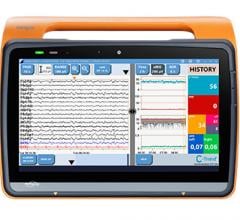July 11, 2008 - A new study that found wireless systems that track hospital medical equipment can cause potentially hazardous incidents involving lifesaving devices may have caused needless alarmed, says a biomedical engineering technology professor at Indiana University-Purdue University Indianapolis (IUPUI).
Barbara Christe, who directs the biomedical engineering technology program in the Purdue School of Engineering and Technology at IUPUI, said this week a study that she completed in March 2008 and has been accepted for publication in Biomedical Instrumentation and Technology found the wireless systems using Radio-Frequency Identification (RFID) devices did not interfere with or influence the performance of commonly used medical devices such as physiological monitors and intravenous pumps in general patient care rooms. This disputes claims in a recent Dutch study that claimed RFID does cause interference.
“The use of RFID systems to manage inventory, track items and ease patient billing data collection can be used in general patient care rooms without concern of adverse device performance,” Christe said.
The most basic RFID system typically includes four pieces of equipment: a host computer, a transceiver, an antenna, and a tag.
The study does note that as new RFID components and systems are introduced in the future, further study may be necessary to evaluate RFID technology and its impact on medical equipment.
The study warning of electromagnetic interference from RFID devices inducing potentially hazardous incidents was published June 25 in the Journal of the American Medical Association by Dutch researchers. These researchers examined a wider range of medical equipment than did Christe, including critical care equipment not commonly found in general patient care rooms.
However, Christe said the Dutch study did not attempt to reproduce a setting that would typically be found in a hospital for the tests they conducted, as she did with her study. In fact, the conclusions of the Dutch study refer to a “controlled nonclinical setting.”
The Dutch researchers tested RFID devices as close as .1 cm from medical equipment, which she said is very unlikely in real world use, since the RFID purpose is to track assets without physical contact, Christe said. RFID antennas are generally placed in a doorway or a corner of a room.
In Christe’s study, RFID antennas were placed as close as one foot from medical equipment. Even that distance, she said, is far closer than would typically be the case in a patient’s room. No interference was found in 1,600 tests she conducted in a patient room at Community North Hospital in Indianapolis. Christe tested pumps, noninvasive blood pressure monitors, pulse oximetry monitors, ECG monitors and sequential compression devices using two common RFID antennas, near field and far field.
The Dutch study tested the impact of RFID devices on medical equipment in a manner that was anything but a typical use setting, Christe said.
“If I swallow my cell phone, I may have some type of hazardous interaction, but that is not an appropriate or typical use of a cell phone,” she said.
For more information: http://info.iupui.edu


 October 21, 2025
October 21, 2025 









